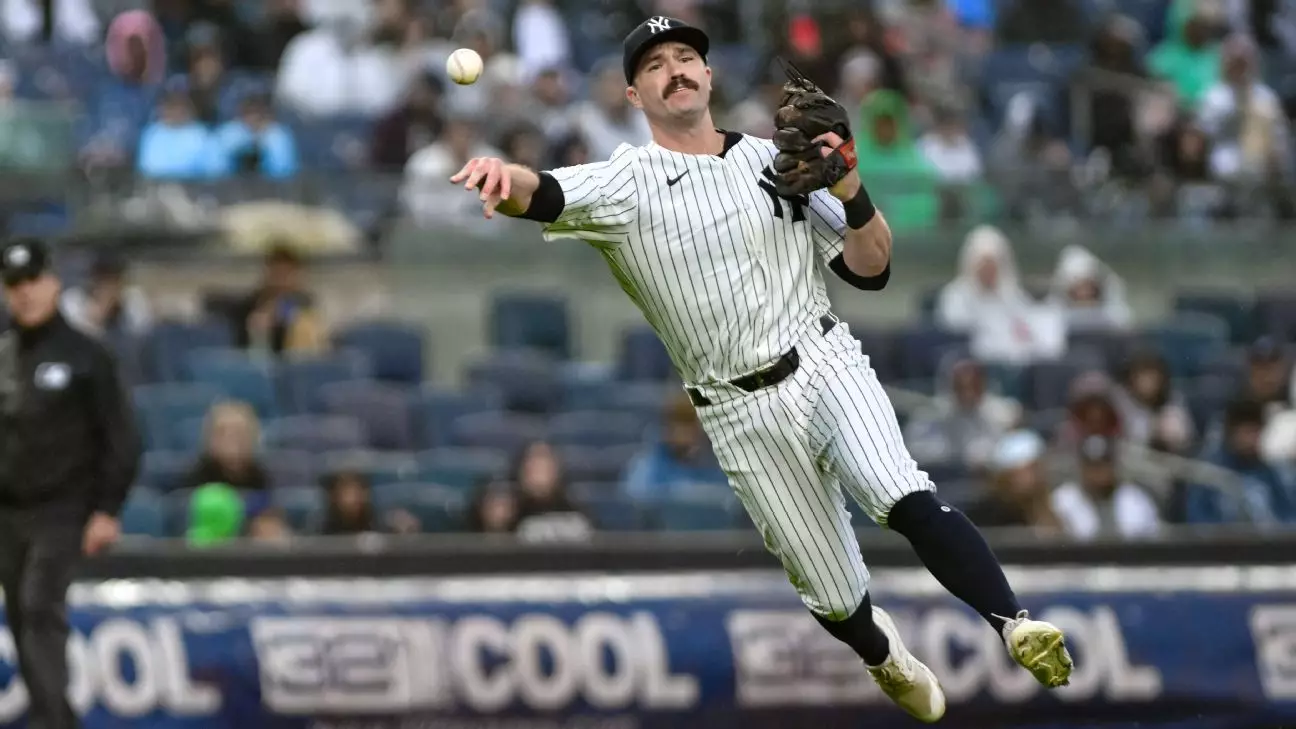In the ever-evolving landscape of Major League Baseball, adaptability becomes a crucial asset, particularly during high-stakes moments like the postseason. The New York Yankees are currently feeling the weight of this necessity owing to injuries sustained by key players. As they navigate the American League Division Series against the Kansas City Royals, manager Aaron Boone is compelled to make adjustments, including the starting debut at first base for Jon Berti—a position he hasn’t played extensively in his career.
Injuries, especially to pivotal athletes like Anthony Rizzo, can disrupt the coordination of a team just as they enter crucial postseason play. Rizzo, known for his strength and experience, suffered fractured fingers, which has sent shockwaves through the Yankees’ lineup. With him sidelined, Boone must tap into the versatility of his roster, leading to the decision to start Berti at first base for the first time in a competitive game. This move signifies more than just filling a void; it highlights the Yankees’ commitment to staying competitive despite daunting challenges.
Berti’s journey to this pivotal moment is noteworthy. Despite being acquired from the Miami Marlins just before the season commenced, he has shown consistent performance, hitting .273 in his limited appearances. His adaptability in playing various positions—second base, third base, and left field—makes him a valuable asset during this crisis. Boone’s confidence in Berti, citing his “natural” abilities infield, underscores the importance of having players who can pivot in their roles seamlessly.
While Rizzo’s injury places additional pressure on the team, it also offers an opportunity for younger players to make their mark. Oswaldo Cabrera filled in for Rizzo in Game 1, displaying not only defensive skills but also resilience at the plate, albeit with a challenging performance against the Royals pitching. His ability to step up in such a critical moment is vital for the morale and cohesive strength of the team. Meanwhile, rookie Ben Rice, who previously covered first base due to another injury to Rizzo, presents an additional option, showcasing the depth of the Yankees’ roster.
Despite their collective skills, both Cabrera and Rice struggled against left-handed pitching this season, creating added uncertainty for Boone as he strategizes. The choice of Berti over Rice or Cabrera reveals Boone’s willingness to take calculated risks in a low-margin game environment typically associated with the postseason.
As much as the challenges presented by lineup changes have consumed the headlines, managing pitching becomes equally essential. With Clarke Schmidt taking the mound for Game 3, Boone’s strategy shifts focus to the rotation amid a playoff scenario that favors experienced pitchers. Schmidt’s 2.85 ERA and relatively strong performance throughout the season suggest he can hold his own under pressure, and this opportunity offers him personal validation for his hard work, especially after recovering from a strained lat muscle that cut into his season.
By opting for Schmidt over the young and raw talent of Luis Gil, Boone signifies an emphasis on stability in his pitching staff during the playoffs. Schmidt’s prior experience complements the robustness of the Yankees’ rotation, which includes established pitchers like Gerrit Cole and Carlos Rodón. Combining robust offense with a strong pitching strategy, the Yankees aim to recover and sustain their competitive edge in the absence of key players.
The New York Yankees’ current situation encapsulates the unpredictability of sports, where injuries can stymie the ambitions of even the most talented teams. However, through strategic adaptations, such as starting Berti at first base and choosing Schmidt as a starting pitcher, the Yankees exemplify resilience. These decisions reflect a broader ethos within professional sports: when faced with adversity, innovation and resourcefulness are paramount. As the series against the Kansas City Royals progresses, the Yankees will undoubtedly require their depth—both in talent and tenacity—to advance toward their ultimate goal of a championship.

